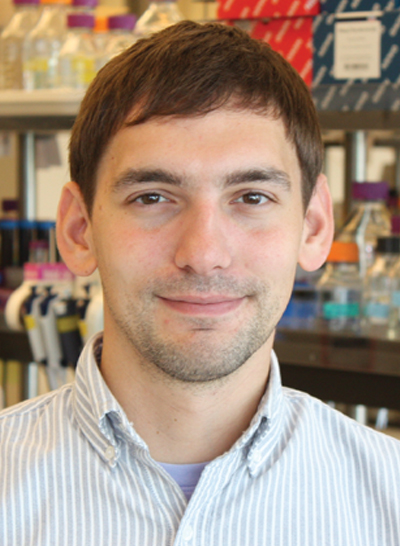Postdoc wins Tabor award for lipid membrane research
Lipid membranes surround and protect each of our cells. They serve as a first line of defense, allow for intracellular signaling and keep subcellular compartments separate. The lipid composition must therefore be diverse and distinctive enough to keep a cell running smoothly. Figuring out which lipids are needed where and when can be challenging, however. , a postdoctoral fellow at the University of California, Berkeley, studies lipid properties and why certain ones belong in specific cell membranes. For his research, Budin received a 2017 .
 Itay Budin is a Miller Institute junior fellow at the University of California, Berkeley, and works at the Joint BioEnergy Institute. courtesy of Itay Budin
Itay Budin is a Miller Institute junior fellow at the University of California, Berkeley, and works at the Joint BioEnergy Institute. courtesy of Itay Budin
Budin investigates how lipid composition affects membrane properties and the consequences of altering particular lipids in model organisms. Lipids make up cellular and subcellular membranes and help maintain integrity and compartmentalization. However, manipulation of these lipids to understand their roles has been done primarily in vitro, and tools to recapitulate findings within living organisms are difficult to develop. Budin uses metabolic engineering to explore lipid composition and functionality. He explained that he does this by altering the genes that give rise to particular lipids. He is then able to “rewire” these pathways within the organism to understand which lipids are necessary for a particular membrane and why. Budin and colleagues have learned that a cell’s membrane can act as an environmental sensor, and a particular set of proteins then responds to maintain homeostasis. was published in May 2017 in the journal Metabolic Engineering.
JBC Associate Editor presented the award to Budin in August at the . Receiving the award was a “great honor and real thrill,” Budin said, and receiving it from Voelker, a lipid biologist, reinforced the importance of his work. The award committee thought Budin’s work was instrumental in “assigning a crucial mechanistic role for unsaturated lipids in serving as molecular signals that liberate transcription factors from the endoplasmic reticulum in response to a variety of stimuli,” they wrote with input from Voelker.
Budin earned his Ph.D. in biochemistry and physical biology from Harvard University in the laboratory of investigating the changes in lipid composition throughout evolution. He then came to the University of California, Berkeley, on a Miller Institute Junior Fellowship. He works with at the , a research center in Berkeley focused on synthetic biology and metabolic engineering.
Enjoy reading ASBMB Today?
Become a member to receive the print edition four times a year and the digital edition monthly.
Learn moreGet the latest from ASBMB Today
Enter your email address, and we’ll send you a weekly email with recent articles, interviews and more.
Latest in People
People highlights or most popular articles

Cedeño–Rosario and Kaweesa win research award
The award honors outstanding early-career scientists studying cancer, infectious disease and basic science.

ASBMB names 2026 award winners
Check out their lectures at the annual meeting in March in the Washington, D.C., metro area.

Peer through a window to the future of science
Aaron Hoskins of the University of Wisconsin–Madison and Sandra Gabelli of Merck, co-chairs of the 2026 ASBMB annual meeting, to be held March 7–10, explain how this gathering will inspire new ideas and drive progress in molecular life sciences.

Castiglione and Ingolia win Keck Foundation grants
They will receive at least $1 million of funding to study the biological mechanisms that underly birds' longevity and sequence–function relationships of intrinsically disordered proteins.

How undergrad research catalyzes scientific careers
Undergraduate research doesn’t just teach lab skills, it transforms scientists. For Antonio Rivera and Julissa Cruz–Bautista, joining a lab became a turning point, fostering critical thinking, persistence and research identity.

Simcox and Gisriel receive mentoring award
They were honored for contributing their time, knowledge, energy and enthusiasm to mentoring postdocs in their labs.

